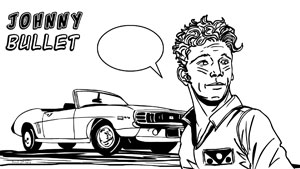|
|
 |
From 1987 to 1996, fabulous comics scribe Neil Gaiman told the story of Morpheus, Lord of Dreams (also known as The Sandman) in the long running The Sandman. After 60 odd issues Gaiman closed the series, but has now returned with a 160-page hardcover to celebrate the 10th anniversary of DC’s Vertigo imprint, where the company publishes its most adult, mature, and artful work.
Endless Nights is a collection of short stories, each one focusing on one of The Endless – Dream and his siblings who also include his sister Death and his brother Destruction. The book shows why so many fans, critics, and contemporaries hold Gaiman, along with Alan Moore, in such high esteem. Not only can one marvel at the imaginative and entertaining tales herein, but Gaiman also tells them with such economy. Like Moore, Gaiman writes scripts that call for the most effective panels; he employs the most evocative language in both dialogue and exposition. He wastes little, a frivolity here or there, and he doesn’t need to decompress his stories into endless panels that would only inadequately mimic cinema.
There’s not a whole lot more to be said about the artists who drew these tales. Most of them are already world-class illustrators, graphic artists, and comic book artists. Two of them, Glenn Fabry, who is known for his comic book cover paintings, and Frank Quitely, who is known for his work with Grant Morrison, are pretty much at the point where they’re much better than the most of the material they will likely ever draw for American comic book publishers.
I wouldn’t call this book perfect, but I had an absolutely wonderful time reading every one of these wonderful fairy tales and stories of the fantastic. No, it’s not perfect, but Gaiman just put his foot against perfection’s door, and I’m sure I heard a loud crack. GRADE A
© Copyright 2002-2026 by Toon Doctor Inc. - All rights Reserved. All other texts, images, characters and trademarks are copyright their respective owners. Use of material in this document (including reproduction, modification, distribution, electronic transmission or republication) without prior written permission is strictly prohibited.

